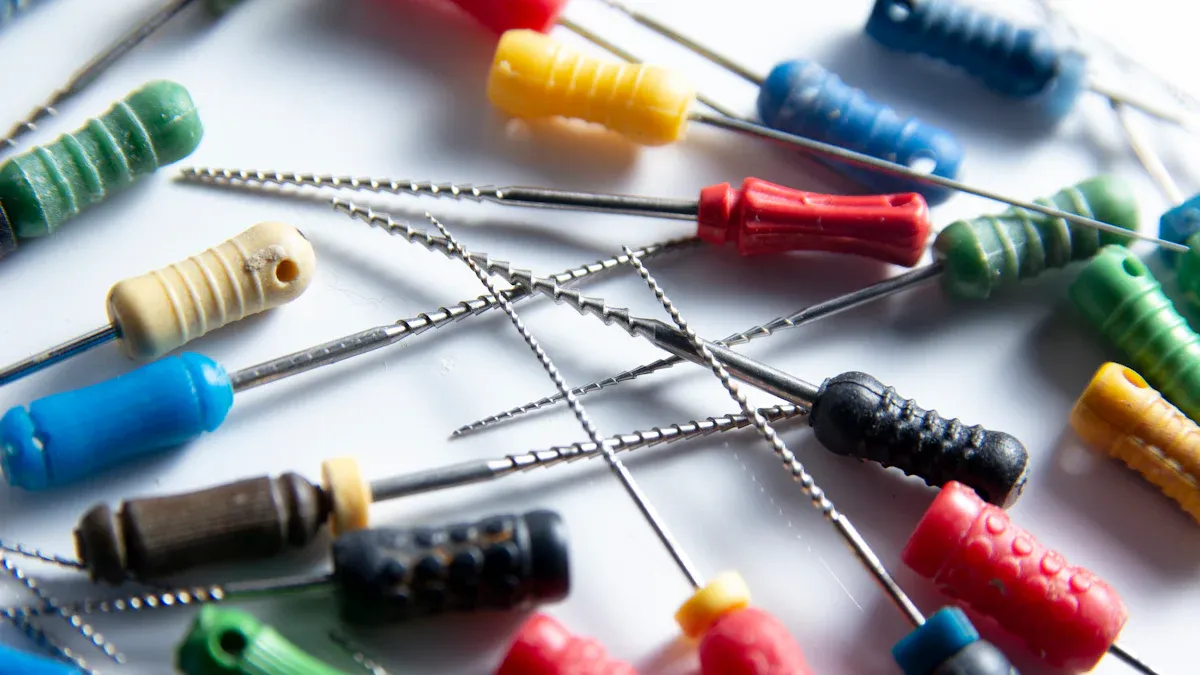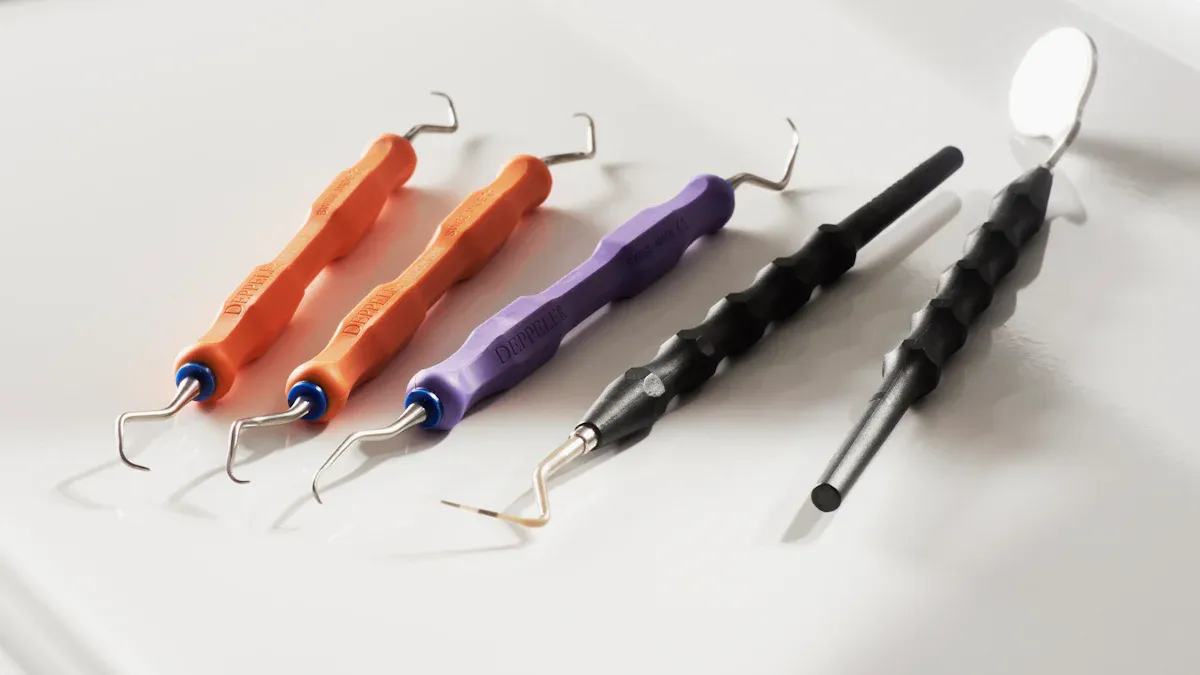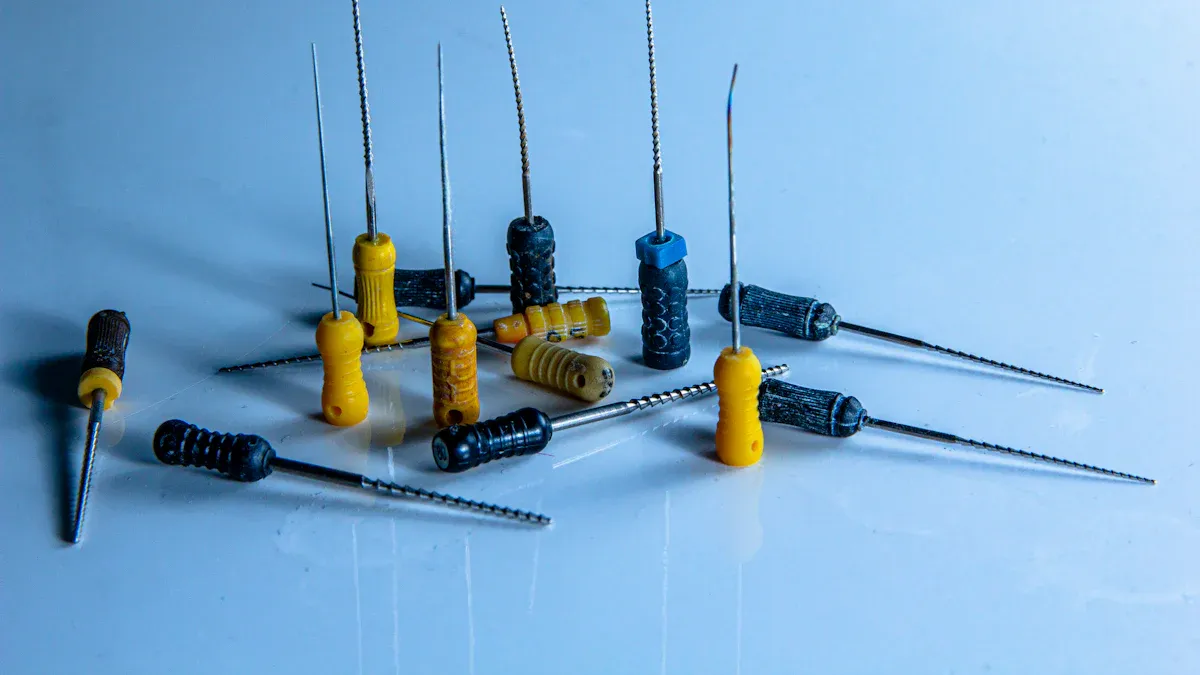How Nitinol Tubing Transforms Root Canal Treatments

Nitinol is a metal made of nickel and titanium, and it has amazing features that have transformed dental care. Its superelasticity allows it to bend and return to shape, making it ideal for tricky root canal paths. The introduction of endodontic Nitinol tubing for root canal files has further enhanced the flexibility and durability of these tools. New heat-treated Nitinol is even more flexible and lasts longer. Tools like ProTaper Next and Wave One Gold demonstrate how Nitinol improves the performance of root canal instruments. These advancements make root canals safer and easier for both dentists and patients.
Key Takeaways
Nitinol tubing can bend and return to shape easily. This makes root canal treatments safer and work better.
Nitinol's shape memory helps tools fit tricky canal shapes. This cleans better and lowers the chance of harm.
Nitinol is safe for the body, so dentists trust it. Patients get safer and better results.
Heat-treated Nitinol tools are stronger and bend more. This means fewer tool changes and faster treatments.
Nitinol tools cause less pain, save time, and keep teeth healthier longer.
What Makes Endodontic Nitinol Tubing for Root Canal Files Unique?

Superelasticity and its Impact on Root Canal Procedures
Superelasticity is a special feature of nitinol. It helps in root canal treatments. This property lets nitinol bend without breaking. After bending, it goes back to its original shape. Endodontic nitinol tubing can easily move through curved root canals. This lowers the chance of tools breaking during the procedure.
A study tested nitinol's superelasticity under heat. The wire was heated from 18.6 °C to 97.7 °C. Even with high temperatures, the wire stayed flexible and strong. This shows nitinol works well in tough conditions like root canals. Dentists can use these tools many times without losing performance. Patients also get better results.
Shape Memory for Adaptability in Complex Canal Anatomy
Nitinol has shape memory, which makes it great for dental tools. It "remembers" its original shape after being bent. This helps root canal files move through tricky canal shapes.
Benefits of nitinol's shape memory include:
At room temperature, files are flexible and easy to use.
At body temperature, they curve to fit the canal's shape.
This improves cleaning by removing bacteria and biofilm.
Endodontic nitinol tubing helps dentists work with precision. It keeps the canal's shape intact and avoids problems during treatment.
Biocompatibility and Safety for Dental Applications
Safety is very important in dental care. Nitinol is safe because it is biocompatible. Nickel and titanium bond strongly in nitinol. A protective layer stops nickel ions from leaking. This makes nitinol safe for the human body.
Studies show nitinol is safe for dental use:
Evidence Type | Findings | Source |
|---|---|---|
Lab Safety Tests | Ni50–Ti50 alloy showed safety and helped cell growth over time. | Springer |
Cell Toxicity Tests | Tests proved NiTi alloy is safe for human cells. | Springer |
Surface Coating Benefits | Coating improved safety and stopped corrosion in nitinol. | Springer |
Using nitinol tools ensures safe and effective treatments. Dentists and patients can feel confident about the results.
Stronger and Longer-Lasting Root Canal Files
Tough Against Breaking and Repeated Use
Nitinol is very strong and doesn’t break easily. Root canal files made from nitinol can bend many times without snapping. This makes them dependable during hard procedures. Other materials don’t stay strong under heavy use like nitinol does.
Here’s how nitinol compares to other materials:
Material | Bending Strain Range | Fatigue Resistance Level |
|---|---|---|
Nitinol | 4% - 12% | Higher than 1% for most alloys |
Other Alloys | ≤ 1% | Lower than Nitinol |
This strength lowers the chance of tools breaking. Dentists can trust these files, and patients get safer treatments.
Heat-Treated Nitinol Works Even Better
Heating nitinol makes it stronger and more flexible. This process improves its ability to bend and return to shape. Heat-treated files move smoothly through curved canals. This reduces mistakes during root canal procedures.
Heat treatment also makes nitinol last longer. Dentists need fewer replacements, and patients get better results. These tools are a smart choice for modern dental care.
Resists Rust and Lasts Longer
Nitinol doesn’t rust because of its protective layer. Nickel and titanium bond tightly, creating a shield against damage. This keeps the tools working well in wet places like the mouth.
Important facts about nitinol’s rust resistance:
Test Type | What It Shows |
|---|---|
Rust Protection | Higher values mean better resistance to rust. |
Time in Liquid | Longer time in PBS improves protection. |
Surface Quality | Better finish boosts rust resistance. |
These features help nitinol tools stay reliable over time. Dentists can count on them, and patients benefit from safe and effective treatments.
Superior Performance in Root Canal Treatments
Flexibility for Navigating Curved Canals
Root canals often have twists and turns. Nickel titanium tools handle these curves well. They are very flexible and bend without breaking. Stainless steel files can struggle in curved canals. Nickel titanium tools bend easily and stay strong. This reduces risks like perforations or ledges. It makes the procedure safer and more effective.
This flexibility also makes treatments less painful for patients. Dentists can work confidently, knowing tools won’t snap. Fewer tool breaks mean fewer delays. This leads to faster and smoother root canal procedures.
Precision in Maintaining the Original Canal Shape
Keeping the canal’s natural shape is very important. Nickel titanium files, especially nitinol ones, do this well. They have special tapers that cut only at certain points. This helps shape the canal without removing too much healthy dentin. Cutting flutes make the process faster and more precise.
Here’s a table showing features that improve precision:
Feature | Description |
|---|---|
Flexibility | Nitinol files bend better than steel, helping with tricky canals. |
Variable Tapers | These focus cutting on specific areas for better accuracy. |
Cutting Flutes | Make cleaning and shaping faster and more efficient. |
Reduced Shape Memory | Less bounce back allows pre-curving for hard-to-reach areas. |
Enhanced Fatigue Resistance | New designs last longer and perform better under stress. |
Using nickel titanium tools helps dentists keep the canal’s shape. This lowers the chance of problems and keeps the tooth strong.
Effective Evacuation of Dentin Filings
Removing debris is key during root canals. Nickel titanium tools are great at clearing dentin shavings and infected tissue. Their flexible design helps them clean even hard-to-reach spots. This ensures the canal is thoroughly cleaned.
Patients benefit from this efficiency. A cleaner canal means fewer chances of infection later. The faster cleaning process also shortens treatment time. This makes the experience more comfortable for patients.
Improved Patient Outcomes with Niti Instruments

Easier and More Comfortable Procedures
Niti instruments, made of nickel titanium, make root canals easier. They are flexible and can bend without breaking. This helps them move through tricky canals gently. Dentists don’t need to drill as much, saving more of your tooth. You feel less pain because these tools fit the canal’s shape well.
Studies show Niti instruments are more comfortable. Barbakow and Lutz found 76% of people preferred them. Both dentists and patients liked them better than older tools. Nickel titanium’s special features make the process smoother for everyone.
Shorter Treatment Time and Faster Healing
Niti tools make root canals quicker. They are strong and last a long time. Their flexibility helps clean and shape canals faster. This means fewer visits to the dentist. Parashos and Messer found they sped up treatment in 80% of cases. Bjourndal and Reit noted fewer appointments were needed.
Healing is also faster with Niti tools. They cause less damage to tissues, so there’s less pain after. Studies show patients heal 20% faster with these tools. You can get back to normal life sooner with fewer side effects.
Better Long-Term Results for Teeth
Niti tools help teeth stay healthy longer. They keep the canal’s shape, which protects the tooth. This lowers the chance of problems like reinfection or cracks. Koch et al. found Niti tools improve the quality of root fillings, which is key for success.
These tools are also very durable. They resist wear and rust, even after many uses. This makes them reliable for cleaning and shaping canals. With Niti tools, you can trust your treatment will last.

Comparison with Traditional Materials
Why Nickel Titanium is Better than Stainless Steel
Nickel titanium files are more flexible and durable than steel. They bend easily and return to their original shape. This makes them perfect for curved root canals. Stainless steel files are stiff and can cause mistakes like zipping or ledging. Nickel titanium tools adjust to the canal's shape without harming the tooth.
Studies show nickel titanium bends two to three times better than steel. This flexibility lowers the chance of breaking during use. Nickel titanium also handles repeated bending without wearing out. These qualities make it a safer and more reliable choice for dentists today.
Problems with Stainless Steel in Difficult Canals
Stainless steel files don’t work well in tricky canals. They are too stiff for curved or calcified canals. This stiffness can cause errors like canal damage or perforation. These mistakes make treatments take longer.
Evidence Type | What It Shows |
|---|---|
Mechanical Performance | Steel files don’t perform well in complex canals. |
Flexibility Issues | Their stiffness makes curved canals hard to navigate. |
Breakage Risk | Steel files break more often, delaying the procedure. |
These problems show why stainless steel is less useful for tough root canals. Nickel titanium tools solve these issues with their flexibility and strength.
Why Dentists Prefer Nickel Titanium Tools
Nickel titanium tools have changed how root canals are done. They resist wear and stay strong, even after many uses. This improves treatment success and helps patients heal faster.
Reports show nickel titanium lasts longer and bends better than steel. It also resists rust, making it reliable in wet conditions like the mouth. These benefits make nickel titanium the top choice for dentists everywhere. Using these tools means safer, quicker, and more effective root canal treatments.
Nitinol tubing changes root canal treatments with its special features. Its superelasticity and shape memory help tools move through tough canals easily. These qualities also make tools last longer and less likely to break. This means quicker treatments, faster healing, and better long-term results for you.
Key Metrics of Nitinol Tubing:
Metric | Value |
|---|---|
Strain Recovery | 5.62% |
Recovery Ratio | 98% |
Role in Minimally Invasive | Critical |
Durability Benefits:
Tools last longer.
Safer and more comfortable procedures.
Nitinol tubing improves dental care, making root canals safer and faster for patients.
FAQ
What is Nitinol tubing, and why is it used in root canal treatments?
Nitinol tubing is made from nickel and titanium. It can bend and return to its shape. This makes it perfect for root canal tools. These features make treatments safer and work better.
How does Nitinol improve the durability of root canal files?
Nitinol is stronger than stainless steel and doesn’t break easily. Heat-treated Nitinol lasts longer and handles stress well. This means fewer tool changes and better results for dentists and patients.
Are Nitinol-based tools safe for dental procedures?
Yes, Nitinol is safe for dental use. A special layer stops nickel from leaking. Studies show it helps cells grow and resists rust. This makes it a trusted choice for dental tools.
Why do dentists prefer Nitinol over stainless steel for root canals?
Dentists like Nitinol because it bends easily and is strong. It moves through curved canals without causing harm. Stainless steel is stiff and can break. Nitinol keeps the canal’s shape and improves results.
Does using Nitinol tools reduce treatment time?
Yes, Nitinol tools make root canals faster. They bend and clean canals quickly. This means fewer dentist visits and faster healing for you.
See Also
Nitinol Tubing: Transforming The Future Of Medical Devices
The Importance Of Nitinol Tubing In Minimally Invasive Surgery
Nitinol Tubing: Key Component For Advanced Medical Technologies

